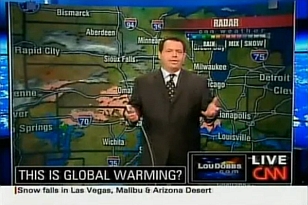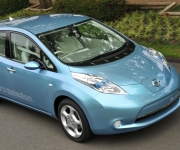 This week in TV-news bashing, we learn that significant numbers of TV weathercasters are serving as climate-change experts, without training in climatology but with lots of confidence in their ability to opine on the subject. Here’s what it means for your weekend. Here’s why this forms a perfect storm of poor understanding:
This week in TV-news bashing, we learn that significant numbers of TV weathercasters are serving as climate-change experts, without training in climatology but with lots of confidence in their ability to opine on the subject. Here’s what it means for your weekend. Here’s why this forms a perfect storm of poor understanding:
- Meteorologists tend to be skeptics. Of 571 TV weathercasters surveyed in a George Mason University study, only 31 percent understand that climate change is happening and is mostly human-caused. Twenty-seven percent consider it a “scam,” though virtually all well-respected scientific institutions affirm the reality of the phenomenon.
- This isn’t their specialty. Meteorology (studying near-term weather) and climatology (studying long-term patterns) are completely different fields, remember.
- They consider themselves qualified. Large majorities of surveyed weathercasters said they are fairly or very well informed about the causes of global warming (93 percent), the consequences of it (89 percent), and the ways to reduce it (86 percent).
- They don’t all trust climatologists. Only 44 percent said they trust the Intergovernmental Panel on Climate Change, the world’s foremost body for weighing and assessing climate science. The New York Times suggests a populist tension shapes this—climate researchers have doctorates and work at universities; TV meteorologists can get hired with a bachelor’s degree.
- But Americans trust their weather person. A study earlier this year found that 56 percent of Americans trusted weathercasters to tell them about global warming, says the Times. That’s far more trust than, say, Al Gore or Sarah Palin enjoy on the issue.
- Nobody else does it. Ninety-four percent of the surveyed meteorologists said their stations had nobody reporting full-time on environment or science.
So it’s a problem. Heidi Cullen, a former Weather Channel climatologist now with Climate Central, tells the Times why the two professions aren’t really in conflict. “They are not trying to predict the weather for 2050, just generally say that it will be hotter,” she said. “And just like I can predict August will be warmer than January, I can predict that.”
And Joe Romm reliably flips his lid on media outlets that treat meteorologists as climate experts: “Memo to rest of media: Asking a meteorologist to opine on the climate is like asking your family doctor what the chances are for an avian flu pandemic in the next few years or asking a mid-West sheriff the prospects for nuclear terrorism.”
Charles Homans wrote a lucid piece in the Columbia Journalism Review earlier this year on why and how weathercasters became skeptical of climate science. The George Mason study mostly confirms what he uncovered. If you’re interested in how climate information arrives in modern American homes, Homans’ story is worth reading.
If you’re interested in constructive responses, the National Environmental Education Foundation has an Earth Gauge program that provides tip sheets for meteorologists on how to show the connections between weather and climate (and other environmental issues).
Here’s some lovely Lou Dobbs footage with meteorologist-skeptic Chad Myers:



